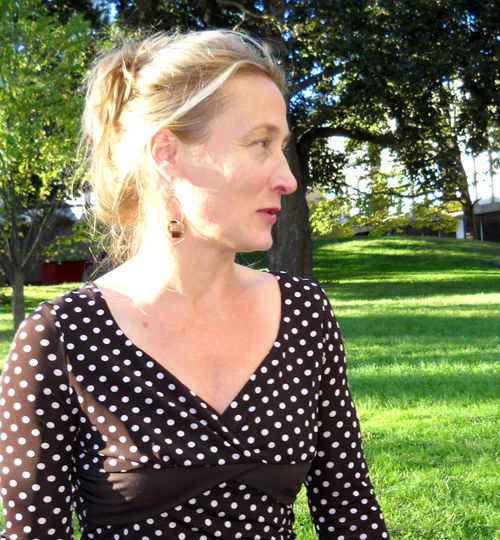
Don’t talk fancy about word gems with Karen Houle. Words are as commonplace as day lilies or starlings, as throwaway as dimes in your pocket. “They’re grit and dirt, and everybody uses them all the time.”
Strong words from a philosopher-poet who joined U of G’s Department of Philosophy – and rejoined her alma mater – in 2005. But that’s how her poet side feels about her chosen medium of expression.
Fitting, maybe: If you’re aiming to reach people through common experience, why not use a common currency?
That idea will form part of her talk planned for the Guelph Lecture Nov. 8. Houle will be the literary guest for On Being Canadian at the River Run Centre, where she will discuss how she writes poetry.
She has published two collections: During in 2008 and Ballast in 2000.
For Houle, building a poem begins with single words, lines or images. Often those fragments arrive while she’s doing something else — riding the bus, say, or even making notes from Hegel or Foucault.
Seated recently in her MacKinnon Building office, she flips through a notebook whose scrawled appointments and workaday reminders bump up against those words and phrases snatched from the air.
Here, she says, pointing to a page. Two words together in one day: “ripple, flicker.” The words lie on the paper, but she feels something else stirring – not so much the words themselves but a sensation occasioned by them.
“I’ll take something in, and something shoots like this,” she says, her hand darting past her head. “Not just a word but something went – thrrrppp – through it.”
Those bits of sensation collect over time, mounting inside like water in a cistern. Right now, she says the reservoir is only about 20-per-cent full.
To write, she needs two things: beautiful surroundings and solitude. She finished both of her collections at the Sage Hill writers’ retreat in Saskatchewan.
Tapping into emotion through her writing is important for Houle, who says her own feelings have always lain close to the surface. Often, she’s aiming to make sense of what defies understanding — 9/11, say, or the Bernardo killings. “My poems come from me trying to restabilize.”
Rather that focus on tragedy alone, she’s interested in the spots where good meets bad meets banal. “It’s not just that bad things or good things happen. These things happen all the time in a normal kaleidoscope.”
In a single day recently, for instance, she found herself puzzling over what to do with leftover water bottles from a conference even as the bank was repossessing her older sister’s house. The good?
Shifting in her chair, she gazes at the courtyard beneath her window in the MacKinnon Building. “The light,” she says, “picking up the last of the green in that corkscrew willow.”
Plus, it’s her daughter’s wedding anniversary. Kuusta Laird Barry, one of Houle’s 25-year-old twin daughters, is working on a master’s degree in Latin American and Spanish studies and serving as a TA in the School of Languages and Literatures. Mom and daughter have even taught some of the same students in respective first-year classes.
Good, common and rare dwell together, says Houle. Trained as both a scientist and a philosopher – she studied biology at Guelph before completing graduate degrees here in philosophy — she says, these are “different ways of writing and thinking. Poetry is special in its capaciousness for linking these disparate processes. Poetry is capacious. It’s really hospitable to that kaleidoscope.”
Writing for Houle involves patient shifting and re-shifting of words, testing the feel and sound of each against the next.
How does she know when the poem is done? “You feel a kind of balance,” she says. Add or take away one word, and the structure will tumble down.
During her lecture, she hopes to impress upon listeners just why poetry matters.
Especially for teens, she says, “I would like them to have heard poetry can do something to help navigate the world that I think does it better than other forms of responding.”
Poetry can point to ways to live a life and even help to save a life, says Houle. How? By underlining shared experience and responses, she says, and by reminding readers and listeners that they’re not alone in their world. “Poems have kept me from losing it. You find a poem, and you can’t believe it.”
The Guelph Lecture will take place Nov. 8 at 7 p.m. The event will feature Lee Smolin from the Perimeter Institute for Theoretical Physics in Waterloo, Ont.